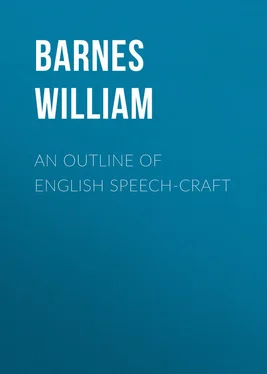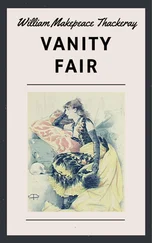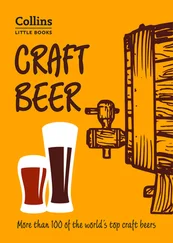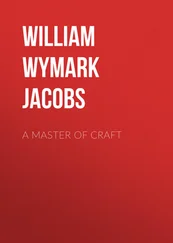William Barnes - An Outline of English Speech-craft
Здесь есть возможность читать онлайн «William Barnes - An Outline of English Speech-craft» — ознакомительный отрывок электронной книги совершенно бесплатно, а после прочтения отрывка купить полную версию. В некоторых случаях можно слушать аудио, скачать через торрент в формате fb2 и присутствует краткое содержание. Жанр: foreign_antique, foreign_prose, на английском языке. Описание произведения, (предисловие) а так же отзывы посетителей доступны на портале библиотеки ЛибКат.
- Название:An Outline of English Speech-craft
- Автор:
- Жанр:
- Год:неизвестен
- ISBN:нет данных
- Рейтинг книги:3 / 5. Голосов: 1
-
Избранное:Добавить в избранное
- Отзывы:
-
Ваша оценка:
- 60
- 1
- 2
- 3
- 4
- 5
An Outline of English Speech-craft: краткое содержание, описание и аннотация
Предлагаем к чтению аннотацию, описание, краткое содержание или предисловие (зависит от того, что написал сам автор книги «An Outline of English Speech-craft»). Если вы не нашли необходимую информацию о книге — напишите в комментариях, мы постараемся отыскать её.
An Outline of English Speech-craft — читать онлайн ознакомительный отрывок
Ниже представлен текст книги, разбитый по страницам. Система сохранения места последней прочитанной страницы, позволяет с удобством читать онлайн бесплатно книгу «An Outline of English Speech-craft», без необходимости каждый раз заново искать на чём Вы остановились. Поставьте закладку, и сможете в любой момент перейти на страницу, на которой закончили чтение.
Интервал:
Закладка:
AMH,
ANH,
AM,
AN,
ANG;
as in the half-pent sounds —
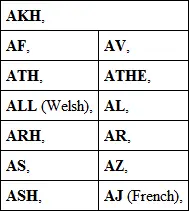
half-pent by the tongue and mouth-roof.
For a hard breathing the mark is H, as and , hand ; art , hart .
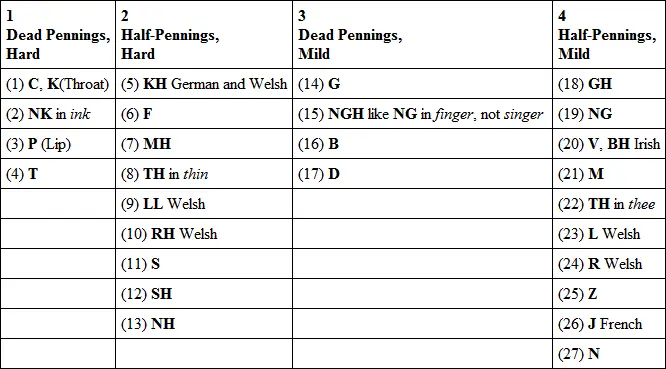
Words are of breath-sounds, and some words are one-sounded, as man ; and others are tway-sounded, as manly ; and others many-sounded, as unmanliness .
There is word-strain and speech-strain.
The high word-strain (accent) is the rising or strengthening of the voice on one sound of a word, as man´ly .
The high speech-strain (emphasis) is the rising or strengthening of the voice on a word of a thought-wording.
The voice may both rise and fall on the same sounds, as nō .
In English and its Teutonic sister speeches the strain keeps on the root or stem-word, as man , man´ly , man´liness ; though in clustered words, with their first breath-sounds the same, the strain may shift for the sake of clearness, as ‘Give me the tea ´pot’ – the tea kettle is given, and thereupon the bidder may say ‘the teaPOT´,’ not the teaKETTLE.
In Greek the accent shifts in word-building, and likes mainly to settle at about two times or short breath-sounds from the end of the word; and in Welsh it settles mostly on the last breath-sound but one, as eis´tedd , a sitting; eistedd´fod , a sitting-stead; eisteddfod´an , sitting-steads, or bardic sessions.
Besides the word-strain (accent) and the speech-strain (emphasis), there is a speech-tuning (modulation) of the voice (voice-winding), which winds up or down with sundry feelings of the mind, and with question and answers and changes of the matter of speech.
Things may be matterly (concrete) or bodies of matter, as a man , a tree , a stone ; or
Things may be unmatterly (abstract), not bodies of matter, as faith , hope , love , shape , speed , emptiness .
It is not altogether good that a matterly and unmatterly thing should be named by the very same word, as youth , a young man, and youth , youngness.
THINGS AND THING-NAMES
Things are of many kinds, as a man , a bird , a fish ; an oyster , a sponge , a pebble ; water , air , earth ; honey , gold , salt .
The names of things may be called Thing-names.
But there are one-head thing-names (proper names), the names each of some one thing of its kind; as John , the miller; Toby , the dog; Moti , the lady’s Persian cat.
With Christian names may be ranked the so-called patronymics , or sire-names , taken from a father’s name, as William Johnson , Thomas Richardson ; or in Welsh, Enid Verch Edeyrn ; or in Hebrew Jeroboam Ben-nebat .
Thing Sundriness and Thing Mark-words.
☛ Mark is here to be taken in its old Saxon meaning, mearc – what bounds, defines, describes, distinguishes.
The Welsh call the adjective the weak name or noun, enw gwan .
Sundriness of Sex, Kindred, Youngness, and Smallness.
Marked by sundry names or mark-words, or mark endings.
Sex.
The stronger or carl sex, as a man ; the weaker or quean sex, as a girl ; the unsexly things, as a stone .

In Saxon the sexes in mankind were called halves or sides , the spear-half and the spindle-half.
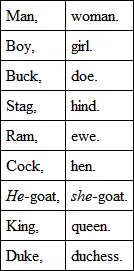
Kindred, Youngness, or Smallness.
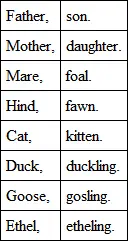
Small Things.
By forlessening mark-endings:
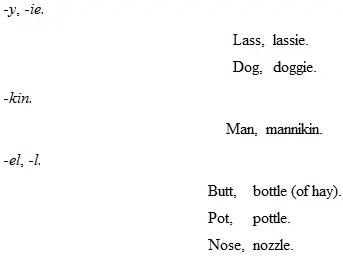
By mark-words:
A wee house, a little boy.
For bigness the English tongue wants name-shapes.
We have bul , horse , and tom , which are mark-words of bigness or coarseness.
Bulfinch.
Bullfrog.
Bulhead (the Miller’s Thumb. Pen-bwll, Welsh ).
Bulrush.
Bulstang (the Dragonfly).
Bullspink.
Bulltrout.
Horse.
Horse-bramble.
Horse-chesnut.
Horse-laugh.
Horse-leech.
Horse-mushroom.
Horse-mussel.
Horse-tinger.
Horse-radish.
Tom.
Tomboy.
Tomcat.
Tomfool.
Tomnoddy.
Tomtit.
The words bul and horse are not taken from the animals.
Sundriness in Tale.
By tale mark-words, as one , five , ten , and others onward.
Sundriness in Rank.
By rank-word, as first , fifth , tenth , last .
An , a , the so-called indefinite article, is simply the tale mark-word an , one.
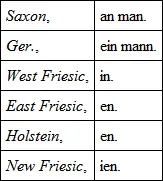
We use a before a consonant, and an before a vowel, as a man, an awl. But it is not that we have put on the n to a against the yawning, but it is that the n has been worn off from an .
The Frieses and Holsteiners now say ien man and en mann .
The mark-word an , a is of use to offmark a common one-head name, as ‘I have been to a white church ’ (common); or, without the mark-word, ‘I have been to Whitechurch ’ (one-head), the name of a village so called. ‘He lives by a pool ’; ‘he lives by Pool ’ (a town in Dorset). ‘He works in a broad mead ’; ‘he works in Broadmead ’ (in Bristol).
As the Welsh has no such mark-word, it might be thought that it cannot give these two sundry meanings; and the way in which it can offmark them shows how idle it is to try one tongue only by another, or to talk of the unmeaningness or uselessness of the Welsh word moulding.
Llan-Tydno would mean a church of Tydno , but the parish called ‘The Church of Tydno’ is in Welsh Llandydno , which, as a welding of two words, hints to the Welsh mind that Llandydno is a proper name, and so that of a parish.
Hoel da would mean a good Hoel ; but to Hoel, the good king, the Welsh gives as a welded proper name Hoel dda ; and to Julius Cæsar the Welsh gives, as one welded proper name, Iolo-voel , Julius-bald, whereas Iolo-moel would mean some bald Julius.
Читать дальшеИнтервал:
Закладка:
Похожие книги на «An Outline of English Speech-craft»
Представляем Вашему вниманию похожие книги на «An Outline of English Speech-craft» списком для выбора. Мы отобрали схожую по названию и смыслу литературу в надежде предоставить читателям больше вариантов отыскать новые, интересные, ещё непрочитанные произведения.
Обсуждение, отзывы о книге «An Outline of English Speech-craft» и просто собственные мнения читателей. Оставьте ваши комментарии, напишите, что Вы думаете о произведении, его смысле или главных героях. Укажите что конкретно понравилось, а что нет, и почему Вы так считаете.
